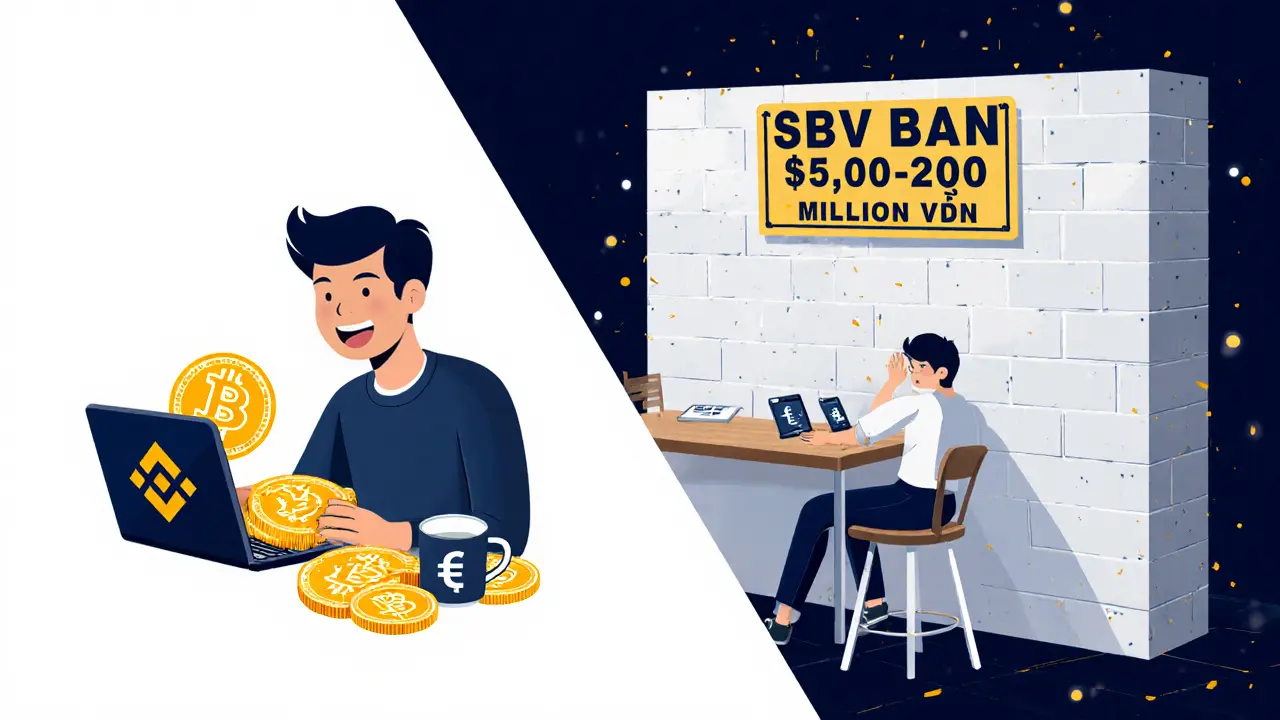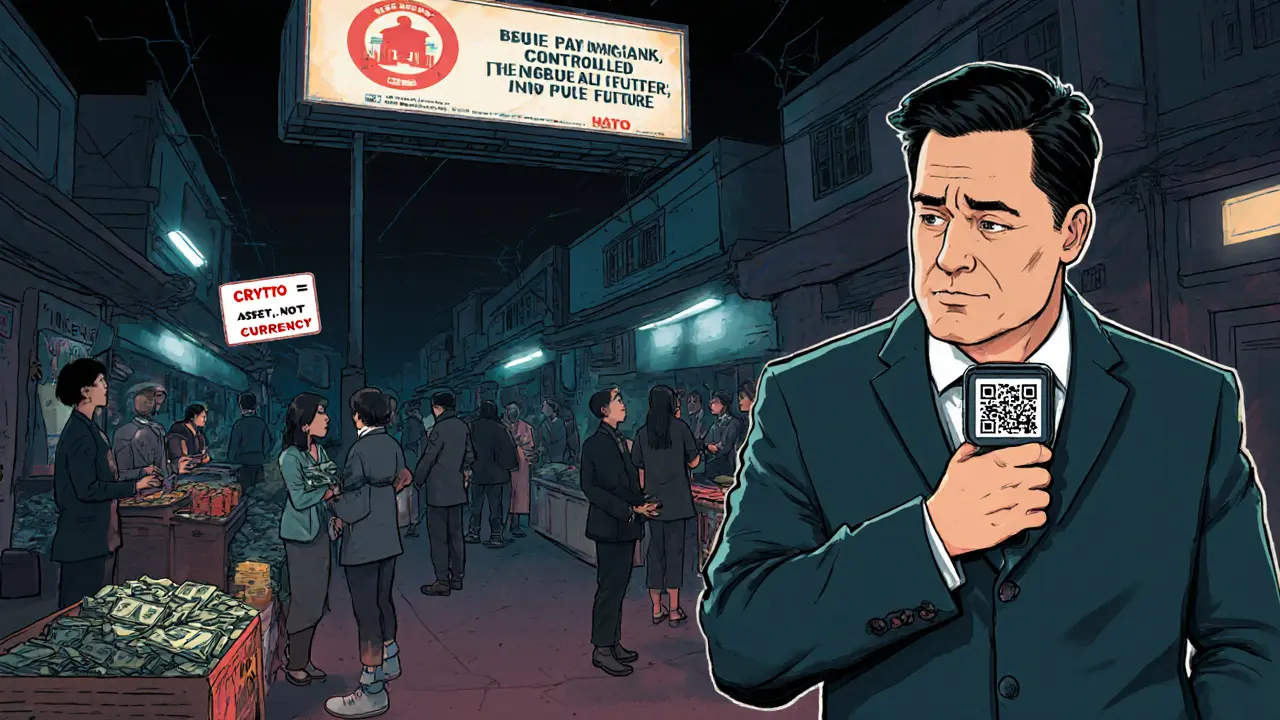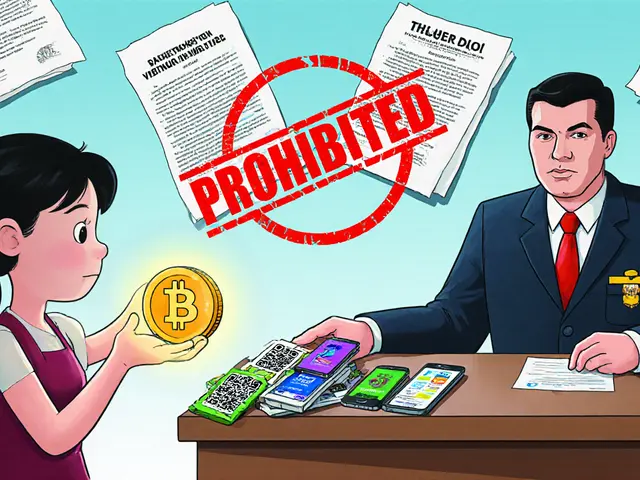Vietnam Crypto Payment Fine Calculator
Calculate Your Potential Fine
If you use cryptocurrency to pay for goods or services in Vietnam, you could face a fine of 150-200 million VND ($6,500-$8,900 USD). This calculator shows how much that fine would be equivalent to in real-world terms.
If you’re using Bitcoin or any other cryptocurrency to pay for goods or services in Vietnam, you could be hit with a fine of up to 200 million VND-roughly $8,900 USD. That’s not a warning. That’s the law. And it’s been in effect since January 1, 2018.
Why is using crypto as payment illegal in Vietnam?
The State Bank of Vietnam (SBV) made it clear: Bitcoin and other virtual currencies are not legal tender. You can’t use them to buy coffee, pay rent, or settle invoices. The ban isn’t about owning crypto-it’s about using it as money. You can hold Ethereum, Litecoin, or Dogecoin in your wallet without breaking the law. But if you try to pay your landlord in Bitcoin, or your local shop accepts it for groceries, you’re violating Decree No. 96/2014/ND-CP.The SBV’s reasoning is straightforward: cryptocurrencies undermine control over the national financial system. Unlike Vietnamese dong, which the central bank can track, regulate, and tax, Bitcoin transactions are anonymous, decentralized, and untraceable. That opens the door to tax evasion, money laundering, and unregulated capital flows. Le Truong Tung, president of FTP University, put it bluntly: "Accepting bitcoin as payment will make the economy quite complex and difficult to control."
What exactly is banned-and what’s still allowed?
There’s a big difference between using crypto and holding it. The law doesn’t stop you from buying Bitcoin on exchanges like Binance or Kraken. It doesn’t stop you from trading it. It doesn’t even stop you from sending it to someone else. But if you use it to exchange for goods or services, you’re crossing the line.The SBV’s official statement from October 2017 says it clearly: "The issuance, supply, and use of bitcoin and other similar virtual currencies as a means of payment is a prohibited activity." That means:
- ✅ You can buy and hold crypto
- ✅ You can trade crypto on exchanges
- ❌ You can’t pay for a meal, a phone, or a car with Bitcoin
- ❌ You can’t run a business that accepts crypto as payment
Even if you’re a foreigner visiting Vietnam, the rule applies to you. If you try to pay for a hotel room in Ethereum, the hotel could face the fine-and you could be turned away.
How much is the fine, and who gets hit?
The penalty for using crypto as payment ranges from 150 million to 200 million VND ($6,500-$8,900 USD). That’s not a slap on the wrist. It’s a serious financial blow, especially for small businesses.Who gets fined? Mostly businesses that openly accept crypto. In 2017, a university in Vietnam planned to let students pay tuition in Bitcoin. The SBV stepped in immediately and shut it down before it even started. Since then, there haven’t been many public cases of fines being issued-but that doesn’t mean enforcement isn’t happening. The General Department of Vietnam Customs reported in 2017 that daily crypto transaction values were already in the thousands of U.S. dollars, suggesting widespread underground use.
Most people avoid the fine by using peer-to-peer (P2P) trading. Someone might sell you Bitcoin for cash, and you use that cash to pay your bills. That’s legal. But if you scan a QR code to pay for groceries with Bitcoin, you’re directly violating the law.

Why does Vietnam still enforce this ban?
Vietnam’s approach is one of the strictest in Southeast Asia. Thailand and Singapore, for example, created licensing systems for crypto exchanges and allowed regulated use. Vietnam chose to ban it outright.Part of the reason is control. The SBV wants to keep the flow of money within its own systems. It’s invested heavily in digital payment infrastructure like QR code payments, mobile wallets, and bank transfers. In 2019, non-cash payments in Vietnam grew by 35% year-over-year. The central bank sees this as the future-not crypto.
But there’s a contradiction. Despite the ban, Vietnam ranked 8th globally in cryptocurrency adoption in 2021, according to Chainalysis. Over 40% of Vietnamese adults used digital payments in 2020, per the World Bank. People want faster, cheaper, borderless ways to pay. Crypto fills that gap. The government is trying to redirect that demand toward state-approved apps like MoMo, ZaloPay, and VNPay.
Is the law actually enforced?
Technically, yes. The fine is written into law and still active. But in practice, enforcement is rare.There are no public records of hundreds of small shops being fined. The SBV hasn’t released numbers on how many violations occurred since 2018. Most enforcement appears targeted: businesses that make headlines, foreign exchanges operating without licenses, or large-scale money laundering cases.
Dr. Tran Ngoc Ca, former deputy director of Vietnam’s Academy of Finance, said in a 2023 interview: "The 150-200 million VND fine remains technically enforceable but has become increasingly difficult to implement as cryptocurrency usage grows."
That’s the reality. The law exists, but the government is caught between maintaining control and acknowledging a technological shift it can’t stop.

What’s changing? The future of crypto in Vietnam
In 2021, the Ministry of Finance started drafting rules to tax cryptocurrency profits. That’s a big shift. If the government is going to tax your crypto gains, it’s acknowledging that crypto exists-and that it has value.The 2021 Draft Decree on Management of Virtual Assets kept the payment ban but proposed treating crypto as an asset. That means you can own it, trade it, and pay taxes on it-but still not use it to buy things.
It’s a compromise. The SBV keeps its power over the payment system. The Ministry of Finance gets a new revenue stream. And people? They keep using crypto in the shadows.
Experts like Le Hong Hiep from Singapore’s ISEAS-Yusof Ishak Institute argue that Vietnam’s ban is outdated: "It misses an opportunity to harness blockchain technology while failing to address the underlying demand for alternative payment methods."
What should you do if you’re in Vietnam?
If you’re a resident or visitor:- Don’t pay for goods or services with Bitcoin, Ethereum, or any other crypto.
- Don’t run a business that accepts crypto as payment.
- Use ZaloPay, MoMo, or bank transfers instead-they’re legal, fast, and widely accepted.
- You can still buy and hold crypto on exchanges, but keep it separate from daily spending.
Even if you think "no one will find out," the risk isn’t worth it. A fine of 200 million VND is more than the average annual salary for many Vietnamese workers.
What’s next?
Vietnam’s stance may evolve. As crypto adoption grows and global regulations shift, pressure will build to rethink the ban. But for now, the message is clear: crypto is not money in Vietnam. It’s an asset. And using it as payment? That’s still illegal.Can I get fined for just owning Bitcoin in Vietnam?
No. Vietnam’s law only bans using cryptocurrencies as a means of payment-not owning or trading them. You can buy, sell, and hold Bitcoin, Ethereum, or other digital assets without penalty. The fine applies only when you use crypto to pay for goods or services.
How much is the fine in USD?
The fine ranges from 150 million to 200 million Vietnamese Dong (VND). At current exchange rates (as of 2025), that’s approximately $6,500 to $8,900 USD. The exact amount depends on the severity of the violation and the discretion of regulators.
Can foreign businesses accept crypto payments in Vietnam?
No. The ban applies to all entities operating within Vietnam’s territory, regardless of nationality. If a foreign company accepts Bitcoin to pay for services in Vietnam-whether online or in person-it’s violating the law and can be fined.
Why does Vietnam allow crypto trading but ban payments?
The State Bank of Vietnam wants to control the national payment system to prevent financial instability, tax evasion, and money laundering. By allowing crypto trading, it lets people invest without disrupting the dong-based economy. By banning payments, it keeps monetary policy under central control.
Is there a chance the ban will be lifted soon?
Not soon. While Vietnam is moving toward taxing crypto as an asset, the payment ban remains unchanged as of 2025. The State Bank of Vietnam has repeatedly reaffirmed its position. Any change would require major policy shifts and likely involve a licensing system similar to Singapore’s-but no such plan has been announced.
What happens if I’m caught using crypto to pay for something?
You’ll likely receive a warning first. If it’s a business, regulators may issue a fine between 150-200 million VND. Individuals rarely face direct penalties unless they’re involved in large-scale or repeated violations. Most enforcement targets businesses that openly advertise crypto acceptance.

Write a comment